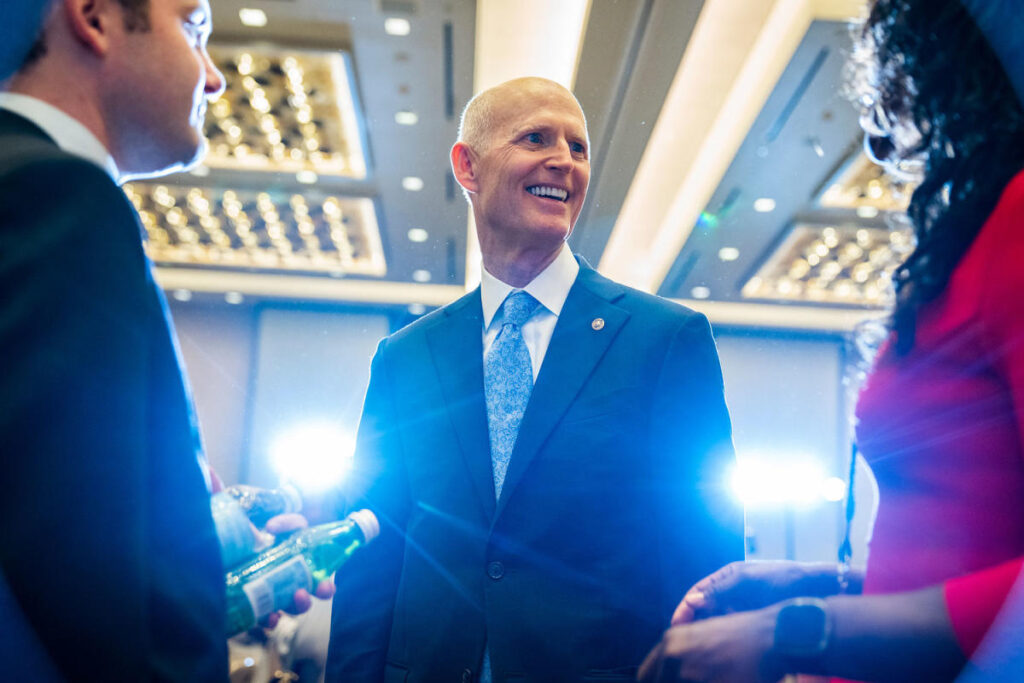The anticipated struggle among Senate Republicans to determine the next majority leader reflects a critical juncture in the Republican Party as it navigates the influence of President-elect Donald Trump’s “MAGA” movement. Amidst a three-way competition, Senate Minority Whip John Thune of South Dakota squares off against former McConnell deputy Sen. John Cornyn from Texas and relatively less recognized Sen. Rick Scott of Florida. This leadership contest will serve as a barometer for the enduring power of traditional Republican incumbents, such as Thune and Cornyn, who advocate for an institutional perspective of the Senate against a resurgent, Trump-aligned faction aiming to dismantle remnants of the establishment GOP.
Rick Scott’s aspirations to secure the leadership position are built on his alignment with Trump’s agenda. He asserts that both his good rapport with Trump and his business acumen will give him the ability to effectively champion the MAGA movement’s priorities. Scott’s candidacy has garnered support from prominent MAGA influencers, including conservative commentator Tucker Carlson and entrepreneur Elon Musk, who endorse his vision of a new Republican direction. Meanwhile, Rep. Marjorie Taylor Greene, a salient figure in Trump’s congressional circle, advocates for Scott, emphasizing the need for a leader who reflects the changing dynamics of the party away from the entrenched power structure.
Despite Scott’s enthusiasm and backing from certain right-wing figures, the road to leadership can be convoluted within the Senate, a structured body defined by seniority and individual relationships. The upcoming vote will be conducted through a secret ballot, which means that individual senators’ choices will not be publicly revealed, affecting the impact of external pressures and online campaigns that might not translate into tangible support. This inherent insulation of the Senate distinguishes it from the more populist impulses often seen in other political arenas, potentially diminishing the weight of Scott’s MAGA backing.
Moreover, Scott faces a significant uphill battle in outpacing Thune and Cornyn, both seasoned Republicans with established relationships and track records of service within the conference. Scott’s less favorable standing among colleagues was highlighted when he received only a handful of votes in a prior leadership challenge against McConnell, making it clear that while he is vocal about representing a new direction for the party, he must also contend with significant institutional resistance. The dynamics within the Senate suggest that relationships and tenure may continue to hold more sway than ideological comradery, particularly within a system that traditionally favors seniority.
Former aides and allies associated with Trump emphasize that the new Republican leadership must ensure alignment with Trump’s America First agenda. Thune’s and Cornyn’s campaigns for leadership are marked by their promises to facilitate Trump’s cabinet and other nominees without obstruction from Senate Democrats, underscoring the call for action to swiftly get key appointments in place. Both candidates exhibit a sense of continuity and dedication to the foundational principles of the party while pledging support for Trump’s strategic goals. Thune, in particular, emphasizes the importance of acting decisively to realize the voters’ mandate.
In contrast, Rick Scott is committed to presenting himself as a modern alternative who can unify the party while heeding Trump’s directives. As the only candidate to actively engage through media appearances to build support during this leadership bid, Scott positions himself as a bridge between the traditional Senate dynamics and the Trump-aligned factions. His response to Trump’s desire for leadership that prioritizes recess appointments demonstrates his willingness to align himself with the priorities of the MAGA movement. As contenders vie for this pivotal leadership role, the outcome will be significant in shaping the future of the Republican Party and testing the balance between traditional governance and the newfound populist pressure exerted by Trump loyalists.

